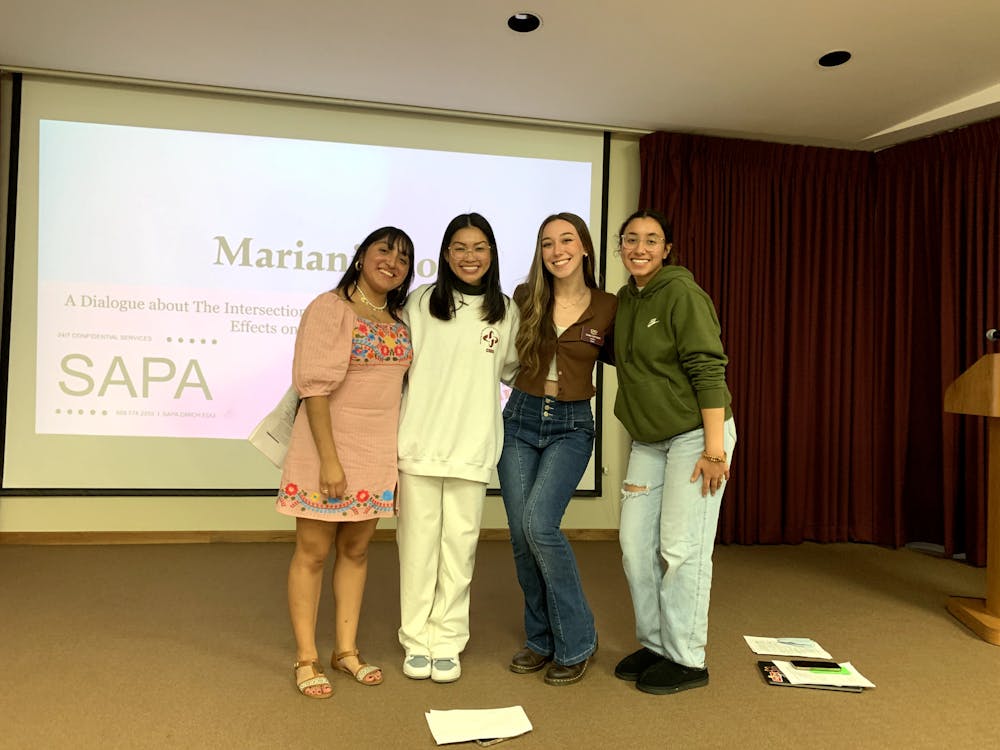'Our generation should be the one to make the change'
Marianismo is a term used in Latine cultures that surrounds traditional gender roles with characteristics of femininity and purity.
The discussion and education about Marianismo and its impacts in Latine cultures took place on Oct. 10 in the Bovee University Center, Auditorium 302 at Central Michigan University.
Students from different backgrounds and cultures attended this event that was put together by the Multicultural Academic Student Services (MASS), the Sexual Aggression Peer Advocates (SAPA) and Sigma Lambda Gamma National Sorority, who opened up a discussion about navigating purity culture, patriarchy and healthy sexuality.
During the presentation, topics covered included historical context, societal influences and personal experiences from the speakers and the audience.
The speakers of the event included Itzel Neri and Jacqueline Huynh who are part of Sigma Lambda Gamma National Sorority. SAPA advocates Emma Watson and Datharine Guzman also presented at the event.
To start the conversation, Neri defined Marianismo as "an idealized traditional feminine gender role characterized by submissive selfishness, chastity, hyper femininity and acceptance of Machismo in males."
Neri shared that her culture comes from Mexico, and her experience with Marianismo and Machismo ideologies are rooted in common phrases and jokes such as 'get him a plate' and 'you should look pretty,' Neri explained how these were these phrases show the expectations that were set for women in Latinx cultures.
Neri also said that Marianismo and sexual aggression intersect.
“You may have heard the phrase, ‘your lucky I’m with you,' which is saying if you do something wrong, you may get hurt,” Neri said.
Neri said the stereotypes that are put on Latina women include cooking, cleaning and taking care of children while the husband or man works to bring in money.
Also, sexual harassment and sexual assault cases are often not taken seriously and result in blaming the victim, Neri said.
“You may have people telling you … you had that coming,” Neri said. “People would question you on how you were dressing, how you were talking and how you were acting, putting the blame on the victim.”
Another topic was brought by Huynh that was the fetishization of virginity in Latin America and Mexico because of the religious culture.
“A man is not expected to save himself for marriage, he is encouraged to go out there and experience women as much as he can before he has to settle down whereas a woman, if she sleeps with one or even a couple more people before she’s married, she’s shamed for it,” Huynh said. “People may look at her in a dirty way because she is not considered pure anymore.”
Guzman further explains an example of purity culture: When a man and woman get married, the woman either wears a white or very light pink dress showing whether or not the woman is a virgin or not.
“When a woman is wearing a white dress, she's a virgin, but when the woman is wearing a dress with pink undertones, she isn’t,” Guzman said.
The last example that was brought up by Huynh was the idea that men are meant to be taken care of whereas women are meant to be the caretakers.
The audience shared experiences about different treatment as children between sisters and brothers from things like the type of gifts received to the difference in expectations that were set.
Other comments from the audience were about how survivors may not know they are survivors due to the accountability being removed from the attacker.
The audience also discussed the media and how sexual aggression and purity culture seems to be inescapable.
Huynh concludes with the question on how we can support those navigating Marianismo or Machismo.
Eli Sherwood, a senior at CMU who studies journalism, finds it important to be aware of others and how you interact with them.
“It helps promote empathy and a greater understanding of situations like this (Marianismo),” Sherwood said.
Delicia Hill, a junior at CMU who studies psychology and family studies, thinks it's important to take opportunities to learn.
“To have opportunities and things like this (event) where you have the opportunity to learn something, I think it's very cool,” Hill said.
Neri finds this presentation important because things discussed are not just happening in Latin America and Mexico, but here in the United States as well.
“It’s something that really affects us because (it shows) we are not developing but staying in the same place,” Neri said.
To conclude the event, Watson said that SAPA is a resource and advocate group that one can reach out to.
“All of our advocates go through 50 hours of training on our big five areas: sexual assault, harassment, stalking, domestic violence and intimate partner violence,” Watson said. “We do educational programs like this to raise awareness as well as offer our 24/7 phone and text crisis line.”
If you're seeking help in any of the areas stated above, you can contact SAPA’s Hotline at 989-774-2255. SAPA’s chat line is 989-621-3359 and their email is sapa@cmich.edu.




